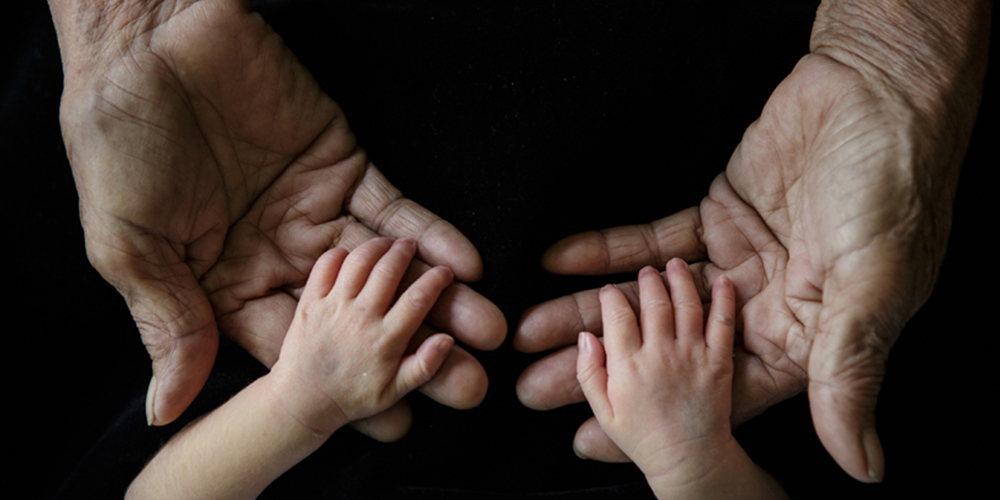 |
Many Christians hoped that when Roe v. Wade was overturned, a new page would be turned in the United States’ history of preserving life. We have been disappointed, which is what happens any time we put our hope in the things of this world. In some ways, it’s a good reminder that it is not the government’s job to teach our children what God says about the value of human life. See how these Christians are promoting value for all lives in their families.
Nicole Balza

A few months ago I was in the car with my children when my eldest (age 9) asked me if it was true that some moms didn’t want their babies who were growing inside them. I wasn’t sure where he had heard this, but I responded honestly. I tried my best to explain the situation in a way that was factual. I illustrated some of the arguments we commonly hear in support of abortion. In his mind, none of them sounded reasonable. He never had to debate whether or not life was important because being raised in our home he simply knew it was.
Sometimes as parents we tend to overthink situations. Had I known the night before that I would be having a conversation with my son on abortion, I probably would not have slept. I might have done a frantic Google search on talking points, reread Bible passages, and rehearsed my dialogue. However, my last-minute preparation wasn’t needed because over the years our family had built a base containing fundamentals in honoring life.
Jesus’ love for all people, especially the outcasts of society, shows a love that is unmatched in our modern culture.
While there are many ways to build this foundation, two quickly come to mind. One is simply to read the Bible as a family. Scripture shows constantly how God values life. From the garden where God shows the value of people by differentiating them from the animals to John the Baptist recognizing Jesus in the womb of Mary (Luke 1:39-45), the Bible is covered in pro-life messaging. Jesus’ love for all people, especially the outcasts of society, shows a love that is unmatched in our modern culture.
Another way to address the value of life in the home is to talk with high admiration about those most vulnerable in society. Whether it is talking with excitement about the arrival of a new baby niece or visiting an elderly family member in a nursing home, showing respect for others whom society has deemed “less than” expresses a love for life at all stages. Sharing Bible stories and explaining God’s love for people are great ways to instill a love of life even in the youngest of children.
Christa Potratz
Christa is a regular contributor to Christian Life Resources’ “Life challenges” podcast. Episode 108 focuses on pro-life Bible stories.
Grandparents have a special role in teaching pro-life values.
The God who creates life and gives eternal life is not only committed to defending the lives of preborn humans but also to defending the lives of those with disabilities and the aging. We grandparents tend to be both. That positions us to testify poignantly about our Father’s love for us and his purpose for our lives.
Our grandkids need to learn from us that the Lord of Life has a plan for everyone, including those who walk more slowly and tire more easily.
- Our grandkids need to learn from us that the Lord of Life has a plan for everyone, including those who walk more slowly and tire more easily. It must be that way; the empty tomb will allow no other conclusion. Grandparents, live out the truth that God’s grace always has exciting plans for you. Refuse to believe you are a burden to others; don’t be frustrated with the life your Father has designed for you.
- Our grandchildren need to learn from us that God has designed us for this moment. Even in old age, we are “created in Christ Jesus to do good works, which [he] prepared in advance for us to do” (Ephesians 2:10). Grandparents, be sure your grandchildren learn from you that your faltering gait, your slowed synapses, your increasing deafness do not make you less valuable in your Father’s eyes or to his plan for the world. They’ve prepared you for service at this time and in this place.
- Our grandchildren need to learn from us to celebrate life because of God’s grace. Celebration may be hard to maintain on days arthritis flares or you realize another layer of independence is lost. But grace assures nothing important has changed. Jesus remains the Savior. Heaven remains yours. Grandparents, your grandkids need to learn from your lips and life that the Lord keeps his promise, “Even to your old age and gray hairs I am he, I am he who will sustain you” (Isaiah 46:4).
When the next generation learns from you how precious God’s gift of life is, precious even to life’s end, it will become more obvious that life is precious from the start.
James Aderman
In February 2020, I went with my book club to visit the National Memorial of Peace and Justice—a memorial which commemorates the Black victims of lynching in the United States—in Montgomery, Ala.
My book club consists entirely of Black women, except for me. I spent the day learning about the atrocities committed by people who look like me against people who look like them. It was heavy and hard and uncomfortable. On the drive home to Atlanta, Ga., my friends made me promise to bring my children to the memorial. One pointed out that I have the power to really contribute to a world that values life by raising children who value life. I had often heard the phrase “value life” in the context of the unborn, but her pointing this out made me think about so many additional ways to value life.
I kept my promise and returned to the memorial with my daughter. We took time to find the hanging steel rectangle that represents our county and read the names of the known lynchings that took place there. We found the jars of dirt from lynching sites that took place in cities we knew and loved. It was heavy and hard and uncomfortable, but I wanted her to cherish these lives and bear witness to these stories.
I have the power to really contribute to a world that values life by raising children who value life.
When I read the parable of the Good Samaritan (Luke 10: 25-37), I think about how uncomfortable it must have been for the Samaritan to cherish the life of the beaten man on the side of the road—to bandage his wounds, carry him on his own donkey, and pay the money for him to stay at an inn while healing. Yet this is what it looks like to love our neighbors as ourselves—to cherish their lives.
It might mean inviting the drug-addicted neighbor who is in and out of jail to church with us. It might mean sitting in grief with friends who lost their only child to suicide. It might mean my 14-year-old becoming friends with a classmate who chose life for her baby and is now a teenage mom. These situations aren’t always comfortable, and sometimes they’re just plain hard.
My prayer is that by showing my children how to be in proximity with others and bear one another’s burdens (Galatians 6:2), I am helping raise up children who are devoted to their neighbors in love (Romans 12:10), children who help their neighbors feel cherished not only by them but also by their Savior.
Carly Seifert
Author: Multiple Authors
Volume 111, Number 01
Issue: January 2024
- Parent conversations: How can parents and kids manage stress?
- Parent conversations: What do your prayers for your children include?
- Parent conversations: How do we resist making our parenting law-based?
- Parent conversations: What Bible passages do you turn to most as a parent?
- Parent conversations: How can we help kids develop positive, healthy habits?
- Parent conversations: What tactics do you use to encourage children to tackle difficult tasks?
- Parent conversations: How can we model good listening skills for our kids?
- Parent conversations: How do we help our kids move on from mistakes?
- Parent conversations: How can we instill gratitude in our children?
- Parent conversations: How can parents find the balance between being too restrictive and too permissive?
- Parent conversations: How can we teach kids to be good friends?
- Parent conversations: What life skills will help young people as they transition to adulthood?
- Parent conversations: How do we discuss death with our children?
- Parent conversations: What does it look like for a father to be a strong Christian leader?
- Parent conversations: How can we help young adults stay engaged in the church?
- Parent conversations: What do parents need to know about video games?
- Parent conversations: How do parents not let worry get the best of them?
- Parent conversations: How do we teach our kids to value all people?
- Parent conversations: When parenting philosophies differ
- Parent conversations: How can we help today’s overwhelmed teens?
- Parent conversations: How can parents maintain a healthy marriage?
- Parent conversations: You might be a Lutheran parent if . . .
- Parent conversations: Parenting post–high school: What is a parent’s role?
- Parent conversations: How can families use the hymnal in their worship life at home?
- Parent conversations: What should Christian parents teach their children about gender?
- Parent conversations: What is vocation? How does it apply to parenting?
- Parent conversations: Why do siblings fight? How should I react when they are fighting?
- Parent conversations: How do we teach children resilience?
- Parent conversations: How do I approach vaccines as a Christian parent?
- Parent conversations: How can I explain the Sixth Commandment to a young child?
- Parent conversations: How can I help my child have an optimistic outlook?
- Parent conversations: What if we can’t follow our Christmas traditions this year?
- Parent conversations: What are ways to foster a rich prayer life in children?
- Parent conversations: How can I let the gospel shine as I parent?
- Parent conversations: How should I handle a child’s separation anxiety?
- Parent conversations: How should families prepare to go back to school?
- Parent conversations: How does a teen’s brain work?
- Parent conversations: How much should I monitor my child online?
- Parent conversations: How can parents reassure children during an uncertain time?
- Parent conversations: How can I stay calm when my child is out of control?
- Parent conversations: Should I give something up for Lent?
- Parent conversations: How can I keep my child engaged in attending church?
- Parent conversations: How can we help a stressed-out kid?
- Parent conversations: How can we nurture a proper view of “stuff”?
- Parent conversations: How involved should parents be in a child’s homework?
- Heart to heart: Parent conversations: Are we modeling kindness for our children?
- Heart to heart: Parent conversations: What’s the best parenting advice you’ve received or given?
- Heart to heart: Parent conversations: How should we handle it when people undermine our parenting decisions?
- Parent conversations: How can we prepare children for summer camp?
- Heart to heart: Parent conversations: What’s a parent’s role as a child dates?
- Heart to heart: Parent conversations: How do parents find contentment?
- Heart to heart: Parent conversations: How can we help a family with a sick parent?
- Heart to heart: Parent conversations: How can parents model healthy cell phone use?
- Parent conversations: How can we protect kids without scaring them?
- Parent conversations: What does your family’s bedtime routine look like?
- Parent conversations: What do I need to consider before I give my child a cell phone?
- Parent conversations: How can we teach gentleness and strength at the same time?
- Parent conversations: What should we do when our children grow silent?
- Parent conversations: What should we teach our children about the Reformation?
- Parent conversations: Do we want our children to be leaders or followers?
- Parent conversations: How does a parent’s role change over time?
- Parent conversations: How should I handle a disagreement with my child’s teacher?
- Parent conversations: What are the building blocks of a strong parent/child relationship?
- Parent conversations: What is our goal as parents?
- Parent conversations: What Christmas traditions do you cherish in your family?
- Parent conversations: How can we raise a generation that cherishes life?
- Parent conversations: What are the best Bible story books for family devotions?
- Parent conversations: Why should children obey their parents?









